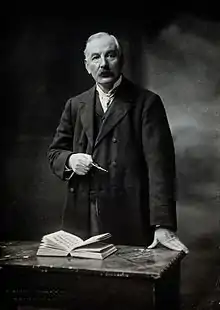Byrom Bramwell
Sir Byrom Bramwell FRSE LLD (18 December 1847 – 27 April 1931) was an eminent British brain surgeon (neurosurgeon), medical author and artist. He was president of both the Royal College of Physicians of Edinburgh and the Royal College of Physicians in London.




Early life and career
Bramwell was born on 18 December 1847 in North Shields in northern England, the son of Mary Young and Dr John Byrom Bramwell.[1]
He was educated at Cheltenham College and then in 1865 travelled to Scotland to study medicine at the University of Edinburgh. There he studied under the eminent anatomist, Sir John Goodsir, John Hughes Bennett, James Syme, and James Young Simpson, a truly luminary group of teachers, evidencing Edinburgh’s position in the forefront of medical education. A keen sportsman, Bramwell also captained the University cricket team.[2]
In 1869 he began the role of house surgeon under James Spence at the Edinburgh Royal Infirmary, but his father’s sudden illness caused him to return to North Shields to take up his role as the local GP. From this role, in 1874 he took over the role of surgeon and pathologist at Newcastle Royal Infirmary.
In 1879 he returned to Edinburgh to work as a surgeon, becoming a member of the Royal College of Physicians in 1880. In 1885 he was living at 23 Drumsheugh Gardens, next door to Dr Kirk Duncanson.[3] He became a lecturer in the extra-mural classes which included the education of women as physicians, at that time banned from the main University, greatly helping to develop this field.[2] Bramwell was the first to teach clinical medicine to women at the Royal Infirmary. He succeeded William Allan Jamieson as President of the Royal College of Physicians of Edinburgh in 1910. He was knighted by King George V in 1924.[4]
He died at his home, 10 Heriot Row in Edinburgh, on 27 April 1931 and was buried in Dean Cemetery close to his tutor Sir John Goodsir.
His house at Heriot Row is the central pavilion of the "palace block" terrace; three storeys over pavement, one attic storey and two basement levels - six storeys in total.
Publications
See[5]
- ’’Diseases of the Spinal Cord’’ (1881)
- Practice of Physic (1883) co-written with James Ormiston Affleck
- ’’Intracranial Tumours’’ (1888)
- ’’Atlas of Clinical Medicine’’ 3 vols (1892-6)
- ’’Lectures on Aphasia’’ (1897)
- ’’Anaemia and some Diseases of the Blood Forming Organs and Ductless Glands’’ (1899)
Positions held
- President of the Royal College of Physicians in Edinburgh 1910–1912
- Fellow of the Royal Society of Edinburgh (1886)
Family
In 1872 he married Martha Crighton (died 1919) in 1872., and together they had two daughters and three sons,[5] J. Crighton Bramwell, a surgeon, Professor Edwin Bramwell FRSE (1873–1952), whose career closely followed that of his father, and Byrom Stanley Bramwell FRSE (1877–1948), who became an advocate.[1]
| Academic offices | ||
|---|---|---|
| Preceded by William Allan Jamieson |
President of the Royal College of Physicians of Edinburgh 1910–1911 |
Succeeded by John Joseph Graham Brown |
References
- "Former Fellows of the Royal Society of Edinburgh; (1783-2002)" (PDF). The Royal Society of Edinburgh. Retrieved 25 January 2017.
- Milne, I. "Notable Fellow; Sir Byrom Bramwell" (PDF). Royal College of Physicians of Edinburgh. Retrieved 26 January 2017.
- Edinburgh and Leith Post Office Directory 1885-86
- http://www.heriotrow.org/Sir-Byrom-Bramwell/
- "Lives of the Fellows; Byrom (Sir) Bramwell". Royal College of Physicians. Retrieved 25 January 2017.